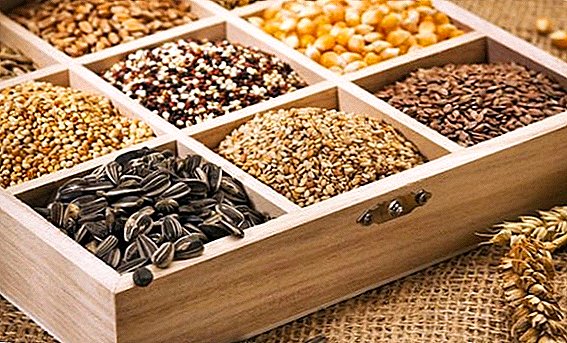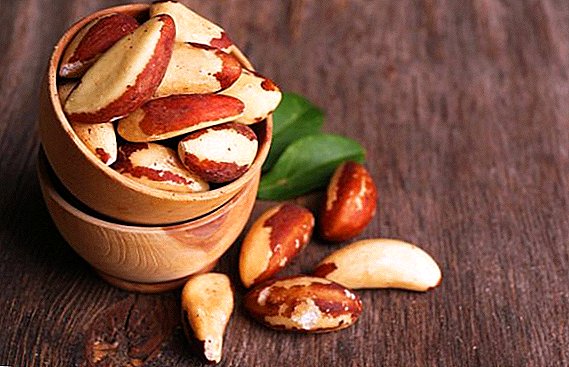 Bertoletija is a monotypic genus of plants that are distributed mainly in South America. The only type of this genus is the tall billet, which is known to the whole world under the name "Brazil nut". The fruits of this plant are quite large in size as a nut. Although to call this product a nut is not entirely correct, because in botany it is called grain. But today's conversation is not about the amazing appearance of the fetus, but about its limitless storehouse of nutrients and vitamins.
Bertoletija is a monotypic genus of plants that are distributed mainly in South America. The only type of this genus is the tall billet, which is known to the whole world under the name "Brazil nut". The fruits of this plant are quite large in size as a nut. Although to call this product a nut is not entirely correct, because in botany it is called grain. But today's conversation is not about the amazing appearance of the fetus, but about its limitless storehouse of nutrients and vitamins.
Calorie and chemical composition
With its rich chemical composition, this product is superior to almost all other existing species.  He is rich:
He is rich:
- vitamins C, E almost the entire group;
- flavonoids;
- fiber;
- polyunsaturated fatty acids;
- selenium;
- copper;
- phosphorus;
- potassium;
- zinc;
- magnesium;
- iron;
- manganese;
- sodium;
- calcium;
- sulfur;
- chlorine;
- biotin.
From the point of view of botany, the fruits of peanuts are not nuts either - they are beans.
Per 100 g of raw raw product accounts for:
- 4.3 g of water;
- 13.6 g of proteins;
- 66.8 g fat;
- 3.6 g of carbohydrates;
- 8.1 g fiber;
- 3.5 g of ash.

The calorie value of a brazil nut is 660 kcal per 100 g of product.
Did you know? In the world there are no Brazil nut plantations that are planted artificially. Fruits are harvested from wild trees pollinated exclusively by orchid bees. At the same time, after pollination, the grain ripens after 1 year and 2 months.
Body benefits
This product, like other nuts, has a lot of protein, fiber and fat, and does not contain bad cholesterol. The product is often used in small quantities in order to reduce weight or build muscle. Also, sometimes people who are committed to a healthy diet replace fatty meats with grains so that the body gets the right amount of correct fat and does not accumulate cholesterol.
We advise you to read about the benefits and hazards of nuts: hazelnuts, hazelnuts, cashews, pecans, almonds, walnuts, Manchu, nutmeg, black.
The Brazil nut contains methionine, which contributes to the breakdown of fats and the generation of vital energy from them, the elimination of free radicals and the preservation of youth.
The most surprising is the amount of selenium, which is contained in bertoletii - if you eat one grain, you can provide yourself with the daily rate of selenium.
Thanks to selenium, the body is protected from cancer, it prevents the development of tumors. And due to the high content of minerals and vitamins, the grain contributes to the protection of the heart muscle, reduces pressure, has a beneficial effect on thyroid hormones, and stabilizes blood clotting rates.  Consider the usefulness of Brazil nuts for men and women. It stabilizes the nervous system, boosts immunity and normalizes the production of hormones that are responsible for reproductive function, and also removes from depression. This product useful for both men and women.
Consider the usefulness of Brazil nuts for men and women. It stabilizes the nervous system, boosts immunity and normalizes the production of hormones that are responsible for reproductive function, and also removes from depression. This product useful for both men and women.
Did you know? Although this plant is called Brazilian, Bolivia is considered the largest exporter of these grains in the world - it collects 50% of all fruits.
Possible harm
Brazil nut, despite its undeniable benefits, can also cause harm to the body.
The main prohibition for the use of this product is the individual intolerance to the human body. If you have an allergy, then it is absolutely impossible to eat Brazil nuts.
Read also about the features of the cultivation of almonds, its types and varieties, ways to combat diseases and pests.
A negative impact on the body can manifest itself only in the case of a large number of eaten grains. But how many Brazil nuts can be eaten per day so as not to expose the body to harmful effects, and what will happen if the daily norm is exceeded - we will now consider.
This product contains barium and radium in small quantities, but they are radioactive substances. We can not ignore this fact, because over time, these substances accumulate in the body and lead to serious consequences. If you do not exceed the daily rate and use 2-3 pieces, then you can be sure that they will not bring any harm to the body.  You also need to know that the shell of this product contains aflatoxins, which can provoke the development of liver cancer. For this reason, a strict restriction has been introduced in the European Union, which prohibits the importation of this product in a shell.
You also need to know that the shell of this product contains aflatoxins, which can provoke the development of liver cancer. For this reason, a strict restriction has been introduced in the European Union, which prohibits the importation of this product in a shell.
The most popular nut in our gardens is walnut. Learn more about the nuances of its cultivation, varieties, diseases and pests.
1 grain per day contains the required amount of selenium for the human body, but when using a large amount of this product, starting from 100 g, occurs a surplus of selenium, which can cause:
- liver damage, which manifests itself in the form of toxic hepatosis;
- hair loss;
- peeling of the skin and exfoliation of the nails.
Important! With a high excess of selenium in the body, poisoning occurs, which can even lead to death.
How to choose when buying
When buying a Brazil nut, it is necessary to take into account the fact that this product is stored for a short time. The fact is that polyunsaturated oils, which contain grain, very quickly become rancid if they are in the sunlight and warm. Therefore, it is better to choose grains that are stored in a refrigerator in bags that do not let in sunlight. Under such conditions, the grain is stored no more than 3 months.  If you decide to purchase a Brazil nut for the first time and do not know how to choose it in appearance, carefully consider the photo on the Internet and compare the quality grain in the photo and what you plan to buy.
If you decide to purchase a Brazil nut for the first time and do not know how to choose it in appearance, carefully consider the photo on the Internet and compare the quality grain in the photo and what you plan to buy.
If you buy grain by weight, then you need to pay attention to the flavor - the quality of the product it will be pleasant, without rancidity. Walnut to the touch should be slightly wet. If you shake a handful of good grains in your hands, they will make a rattling sound. And if you try to break a brazil nut in half, you will hear a ringing crunch.
Find out if cashews, Manchu and black nuts can be grown in your garden.
In what form to use
It is recommended to use grains in fresh, as in such a state they are maximally saturated with useful substances. Brazil nuts are often used in cooking to prepare snacks, sauces, soups, sweet desserts, a variety of pastries, and also as an additive for second courses. Also very valuable product is peanut butter, which is obtained from the Brazil nut. 
Home Storage
Store brazil nuts at home need to the fridgeto extend their shelf life.
For a short time, up to 1 month, you can store the Brazil nut in a glass or porcelain dish, which is tightly closed with a lid, in a dark place.
You can also store the product in the freezer, in this case, the shelf life will be more than six months.
Important! It should be borne in mind that when stored in the refrigerator, the grains can absorb odors, so they are recommended to be placed in tightly closed containers or other dishes that will prevent the penetration of foreign odor.
So, Brazil nut is an amazing product that is able to provide your body with a large amount of essential vitamins and trace elements. But it is important to follow the recommendations on the use and selection of its grains in order to obtain a high-quality and most useful product.












